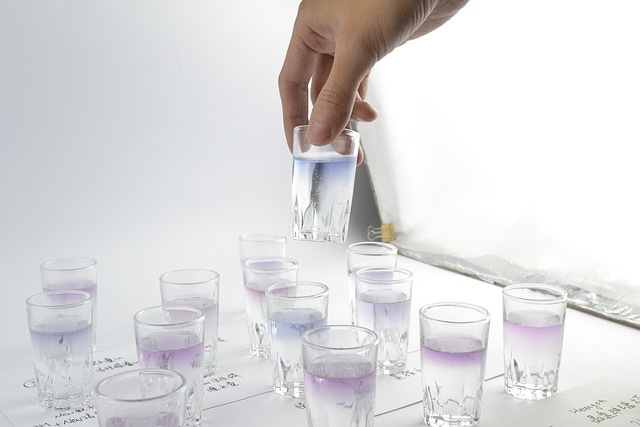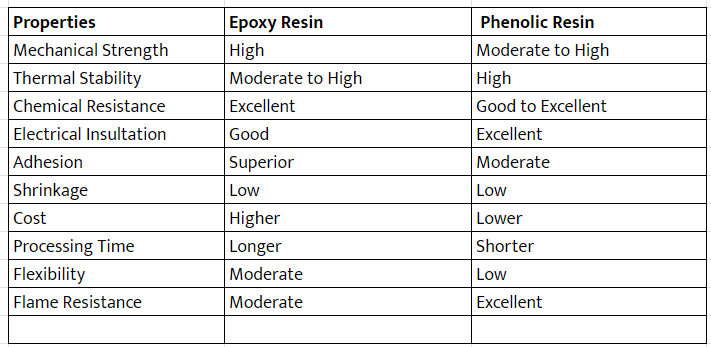Introduction
In the vast world of materials engineering, few substances hold as much significance as resins. Among these, phenolic and epoxy resins stand out due to their versatile applications and remarkable properties. These two types of resins are the backbone of numerous industries, from construction and automotive to electronics and aerospace, where they play crucial roles in enhancing product performance and durability.
Epoxy and phenolic resins have unique chemical structures and characteristics that make them suitable for different purposes. Epoxy resins are celebrated for their exceptional mechanical strength, adhesion, and chemical resistance, making them indispensable in applications requiring robust and reliable materials. On the other hand, phenolic resins are renowned for their high thermal stability, flame resistance, and cost-effectiveness, which make them ideal for use in high-temperature environments and applications demanding stringent fire safety standards. This blog delves into the intricacies of these two remarkable resins, comparing their properties, advantages, and disadvantages to help you make an informed choice for your specific needs.
What is Epoxy Resin?
Epoxy resin is a thermosetting polymer created through the reaction of an epoxide with a polyamine. This chemical reaction forms a highly cross-linked, durable, and rigid material that is renowned for its exceptional mechanical properties. Epoxy resins are versatile and can be formulated to meet a wide range of performance requirements, making them indispensable in many industrial applications. Their strong adhesion and resistance to chemicals, heat, and environmental degradation are just a few reasons why epoxy resins are favored in sectors such as construction, automotive, aerospace, and electronics.
In construction, epoxy resins are used for their high-strength bonding capabilities in adhesives and coatings, ensuring structural integrity and longevity. In electronics, they serve as insulating materials, protecting sensitive components from moisture and electrical interference. The versatility of epoxy resins extends to their use in composite materials, where they enhance the mechanical properties of fibers such as carbon and glass, resulting in lightweight yet robust products. This wide range of applications highlights the indispensable role of epoxy resins in modern industry.

Epoxy Resin – Key Properties, Advantages & Disadvantages
Key Properties
1. High Strength and Durability:
Epoxy resins provide excellent mechanical properties, including high tensile and compressive strength, making them ideal for structural applications.
2. Chemical Resistance:
They offer significant resistance to a wide range of chemicals, including acids, alkalis, and solvents, ensuring longevity and reliability in harsh environments.
3. Adhesion:
Epoxy resins have superior adhesion properties, making them ideal for bonding various materials and ensuring strong, durable joints.
4. Electrical Insulation:
These resins are excellent electrical insulators, suitable for protecting electronic components and systems from electrical interference.
5. Low Shrinkage:
They exhibit minimal shrinkage during curing, which ensures dimensional stability and precision in applications where exact measurements are crucial.
Advantages
1. Versatility:
Can be used in a wide range of applications, from coatings to composite materials, due to their adaptable formulations.
2. Thermal Stability:
Maintains properties over a wide temperature range, making them suitable for use in both low and high-temperature environments.
3. Durability:
High resistance to wear and tear, extending the lifespan of the product and reducing maintenance costs.
4. Aesthetic Finish:
It can be formulated to provide a clear, glossy finish, enhancing the visual appeal of the final product.
Disadvantages
1. Higher Cost:
Generally more expensive compared to other resins, which can be a limiting factor in budget-sensitive projects.
2. Longer Processing Time:
Longer curing times can delay manufacturing processes, requiring careful planning and scheduling.
3. Brittleness:
It can be brittle and prone to cracking under high-stress conditions without proper formulation, necessitating the use of toughening agents or flexible formulations.
What is Phenolic Resin?
Phenolic resin, also known as phenol-formaldehyde resin, is a synthetic polymer created through the reaction of phenol with formaldehyde. It was one of the earliest synthetic polymers to be developed and has since become a cornerstone material in various industrial applications. The reaction between phenol and formaldehyde produces a highly cross-linked, thermosetting polymer that boasts a range of beneficial properties, including high mechanical strength, excellent thermal stability, and notable chemical resistance. These characteristics make phenolic resins particularly valuable in environments that demand robust and reliable materials.
Phenolic resins are widely used in the production of molded products, laminates, coatings, and adhesives. In the automotive industry, they are utilized to manufacture brake linings and clutch facings due to their heat resistance and durability. In electronics, phenolic resins serve as insulating materials in printed circuit boards, while their flame-retardant properties make them suitable for use in fire-resistant coatings and components. The ability to withstand high temperatures without degrading, coupled with their affordability, makes phenolic resins a preferred choice in many cost-sensitive applications.
Phenolic Resin – Key Properties, Advantages & Disadvantages
Key Properties
1. High Thermal Stability:
Phenolic resins can withstand high temperatures without degrading, making them ideal for heat-intensive applications.
2. Mechanical Strength:
Offers good tensile, compressive, and flexural strength, ensuring robust performance in various mechanical applications.
3. Chemical Resistance:
Resistant to a wide range of chemicals, including acids and solvents, providing longevity and durability in harsh environments.
4. Flame Resistance:
Naturally flame retardant, making it suitable for applications that require high levels of fire safety.
5. Dimensional Stability:
Maintains shape and size under different environmental conditions, ensuring reliability and precision in finished products.
Advantages
1. Cost-Effective:
Generally more affordable than epoxy resins, making them suitable for budget-sensitive projects.
2. Fire Retardant:
Excellent resistance to fire and high temperatures, enhancing safety in various applications.
3. Good Electrical Properties:
Effective electrical insulator, making it valuable in electronic and electrical applications.
4. Higher Moldability:
It can be easily molded into various shapes and forms, offering versatility in manufacturing processes.
Disadvantages
1. Brittleness:
Can be more brittle compared to epoxy resins, prone to cracking under stress, which can limit its use in certain applications.
2. Limited Flexibility:
Not as flexible, which can restrict its application in scenarios requiring material flexibility.
3. Processing Complexity:
Requires precise processing conditions for optimal properties, necessitating careful control during manufacturing.
Comparison between Epoxy & Phenolic Resin

Points to Consider While Choosing Between Phenolic Resin and Epoxy Resin
1. Application Requirements:
Assess the specific needs of your application, including factors like mechanical strength, thermal stability, and chemical resistance. For instance, if the application demands high tensile strength and superior adhesion, epoxy resin might be the better choice. Conversely, if the need is for excellent flame retardance and cost-effectiveness, phenolic resin could be more suitable. Understanding these requirements will guide you in selecting the resin that best aligns with your performance expectations.
2. Environmental Conditions:
Consider the operating environment where the resin will be used. This includes evaluating the temperature ranges, humidity levels, and potential exposure to chemicals. Epoxy resins are known for their excellent chemical resistance and performance across a wide temperature range, making them ideal for harsh and variable environments. Phenolic resins, on the other hand, offer superior thermal stability and flame resistance, making them suitable for high-temperature applications and environments where fire safety is paramount.
3. Cost Constraints:
Evaluate the budget for your project and compare the cost differences between epoxy and phenolic resins. While epoxy resins often provide superior performance, they tend to be more expensive. Phenolic resins are generally more affordable and can offer cost savings, especially in large-scale projects. It’s important to balance the cost against the performance benefits to ensure you are making a cost-effective choice without compromising on essential properties.
4. Processing Time:
Take into account the curing and processing times required for each resin. Epoxy resins typically have longer curing times, which can impact the overall production timeline and throughput. Phenolic resins often cure faster, which might be advantageous in scenarios where quick turnaround is essential. Understanding the processing characteristics of each resin will help you plan your manufacturing processes more efficiently and avoid potential delays.
5. Regulatory Compliance:
Ensure that the chosen resin meets any industry-specific standards and regulations relevant to your application. This can include safety certifications, environmental regulations, and performance standards. For example, applications in the aerospace or automotive industries may have stringent regulatory requirements that the resin must comply with. Verifying compliance early in the selection process can prevent costly revisions and ensure that the final product meets all necessary guidelines.
Conclusion
In conclusion, both epoxy and phenolic resins offer unique advantages and are suited for different applications depending on specific requirements. Epoxy resins excel in mechanical strength, chemical resistance, and versatility, making them ideal for demanding industrial applications such as aerospace, electronics, and construction. Their superior adhesion and low shrinkage also enhance their usability in precision applications. However, the higher cost and longer curing times may pose challenges in budget-sensitive projects or where quick processing is essential.
On the other hand, phenolic resins stand out for their high thermal stability, flame resistance, and cost-effectiveness. These properties make them particularly valuable in high-temperature environments and applications requiring stringent fire safety standards, such as in the automotive and electronics industries. While phenolic resins may be more brittle and less flexible compared to epoxy resins, their affordability and excellent electrical insulating properties often outweigh these limitations in many use cases.
Ultimately, the choice between epoxy and phenolic resins should be guided by the specific needs of your application, environmental conditions, budget constraints, processing requirements, and regulatory compliance. By carefully evaluating these factors, you can select the resin that best aligns with your performance expectations and project goals, ensuring optimal results and long-term reliability.
Elchemy is a trusted sourcing partner for these products.














